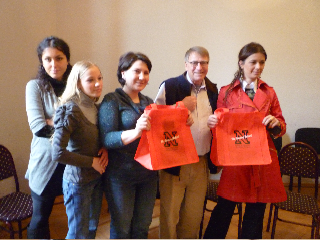
The Republic of Georgia is a long way from Nebraska.
Getting to the country nestled somewhere between Europe and Asia involves lengthy layovers, overnight oceanic flights and the inability to read signs in Georgian.
Miles Bryant, professor of education administration, knows all about the grueling trek across the Atlantic. He ventured to Georgia in the spring of 2010 with some carry-on luggage and a Fulbright Scholar Grant in tow.
"I left January 1 and arrived January 3," Bryant said. "It was a long and arduous journey."
The three-day journey grew into a four-month adventure centered around Bryant's goals of developing a master's program for school administrators at Ilia State University in the capital city of Tbilisi and conducting research on Georgian educational reform.
Although his Fulbright interests were primarily associated with the development of a school administration master's program, a majority of Georgian educators didn't speak English, making Bryant's involvement difficult.
Since the university's spring semester didn't start until March 1, Bryant faced a lot of uncertainty and a lot of free time all at once.
A colleague suggested that Bryant initiate a public lecture on program evaluation with the hopes that students would tap into Bryant's skills as an education administrator.
"It turned out nobody liked program evaluation," he said. "But people became interested in doctoral work (because) it was a great need at the university."
He began offering a seminar for students who were struggling with their doctoral programs. Whether it was finding resources, developing proposals or just needing someone to brainstorm with - Bryant became the doctoral students' best friend.
"I gave this seminar and ended up attracting a lot of students," he said. "(Georgia) doesn't even have a set of coursework that would give doctoral students a foundation in education."
While Bryant discovered that mentoring doctoral students could provide perspective during his Fulbright experience, he encountered obstacles rooted in Georgia's tumultuous sociopolitical history.
Bryant taught one of his classes on the first floor of a building that was originally donated to the university by the Austrian government. Although the first floor is still available for academic use, the rest of the building was sold into private ownership by a previous university director - who pocketed all of the profits from the sale.
"There is rampant corruption in all aspects of Georgian life," Bryant said.
Bryant altered local cafes into gathering places for his students because he didn't have a room of his own.
"They didn't give me an office, so I would hunt around for coffee shops because I like to meet individually with small groups of students," he said.
The library for students in social sciences doctoral programs presented challenges that hindered a student's ability to be successful, said Bryant.
"The library given to the leading program in doctoral social sciences didn't have any resources. I brought books from the States that students wanted copies of, but getting material from the U.S. can take as long as six months."
Bryant turned to technology and downloaded chapters of books using Google Docs, which all students could then access and view.
He also used his online access to Love Library's multiple databases to help a student with her doctoral research proposal.
Since returning from Georgia, Bryant has launched two research projects based on his experiences abroad.
One project is the continual study of Georgian school boards and deciding whether these administrative bodies can establish themselves as part of the newly reformed Georgian education system.
Bryant's other project involves looking at the conditions of Georgian faculty and how they affect a professor's ability to teach.
"Here in the States, we're locked into this tenure system," he said. "Georgia has no tenure, not even long-term contracts. There's no stability, which means faculty can't do long-range planning."
With these projects under way and a vision for educational betterment in Georgia, Bryant's ties to the country will not unravel soon.
"(Georgia has) this goal of becoming a part of the Western research and scholarly community, but there's tremendous infrastructure needs," he said.
"I would want to go back and help them think through what those needs are and what kinds of resources they might go after to capture those needs."
- Mekita Rivas, University Communications